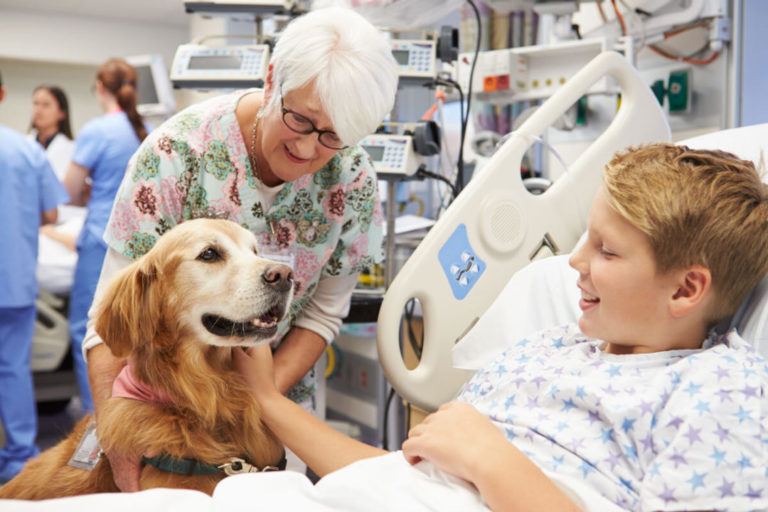Probably now more than ever, people appreciate the power animals have to soothe our souls. Those of us who live with dogs and cats know how having a warm kitty in our lap or having a dog’s silky ears to stroke helps make us feel calmer and more able to cope with life.
The healing magic that animals provide is no secret to health care professionals, who often utilize the calming presence of dogs to help patients heal. These specially trained canine angels are among the therapy dogs we celebrate on National Therapy Animal Day on April 30th.
Therapy dogs provide help to people in all kinds of stressful situations. Nursing homes and hospitals are among the most common places visiting by therapy dogs and their handlers, but they also can provide comfort in a number of other settings.
What They Do
Therapy animals are amazing creatures. I know because I had one. My Pembroke Welsh Corgi, Nigel, was certified by Therapy Dogs International, and was authorized to visit hospitals and nursing homes.
Nigel’s very first therapy dog visit was to see my husband, Randy, who was in the hospital being evaluated for epilepsy surgery. Randy was bedridden and had a series of electrodes implanted in his skull. He had a wad of wires coming out of his head attached to a machine on the wall. It was a scary sight for anyone, let alone a dog. But Nigel’s training kicked in when he saw Randy in that bed. Instead of his usual jovial self at seeing his daddy, he was careful and subdued. I placed Nigel on Randy’s lap, and he lay there quietly while Randy rubbed his ears.
After visiting Randy, I took Nigel down to the waiting area where people were gathered while their family members were undergoing surgeries. We walked among the men, women and children, and saw their faces light up as we approached. Only a couple of people didn’t seem interested in petting Nigel. The rest reveled in their happiness at visiting with the cute Corgi and forgot their worries, if just for a moment.
This is the magic of therapy dogs!
Whatever the situation, whether a person is in the hospital recovering from an illness or permanently bound to a wheelchair, their problems are momentarily forgotten when they feel the love and attention of a therapy dog.
After the mass shooting at the Washington Navy Yard in Washington, D.C., where 12 people were killed in 2013, in the days following the incident, therapy dogs paid visits to the Department of Defense employees who worked there. Co-workers of the slain and wounded were extremely traumatized by the events of that day. In response, an all-volunteer organization called HOPE Animal-Assisted Crisis Response provided certified therapy dogs on the grounds so employees returning to work after the shooting had a way of receiving some comfort. Many were suffering from post-traumatic stress as a result of the event, and seeing the dogs helped calm their frazzled nerves. The dogs also helped some people talk about what had happened, enabling mental health professionals on site to provide some assistance to employees who needed help dealing with this horrific event.
Therapy Dog Qualifications
In order to do therapy work, dogs and other animals need the right kind of temperament. They must love people, but also be calm and trainable. That doesn’t mean they shouldn’t be enthusiastic about meeting new people, but they need to be gentle, and sit or stand quietly while being petted. Any type of aggression, even toward other dogs, disqualifies a dog for therapy work. Prospective therapy animals also need to be well socialized, and be able to handle being around objects like wheelchairs, canes, walkers and other types of medical equipment without showing fear or aggression.
Most pet therapy groups also require that dogs be certified by a therapy dog certification organization before they can visit people in need. The American Kennel Club (https://www.akc.org/sports/title-recognition-program/therapy-dog-program/therapy-dog-organizations) currently endorses five organizations for therapy dog certification: Therapy Dogs International, Alliance of Therapy Dogs, Pet Partners, Love on a Leash, Bright and Beautiful Therapy Dogs and Pet Partners.
These therapy dog associations require dogs to pass a certification test, which confirms that the dog has the training and temperament to do the job of a therapy dog.
Learning Basic Obedience First
Obedience training is the first step in getting a dog ready for therapy work. In order to earn the therapy dog certification, the dog must know how to sit, stay, come, lay down and walk nicely on leash when asked. These are behaviors that dogs need to know to be able to perform well as therapy dogs. Acting like a good canine citizen is imperative since they will be out in the world meeting new people, many of who may be sick or disabled.
Start Therapy Dog Training
Once a prospective therapy dog learns basic obedience, he next needs to learn to be around wheelchairs and other medical equipment, to sit quietly while being petted, to be calm around other dogs, jump up on a bed when asked, and ignore food when told to do so, in addition to other behaviors. Whether your dog can master these tasks will depend a lot on his inherent temperament, as well as his training.
You can find training and certification classes for therapy dogs at canine training facilities and dog training clubs around the country. Classes usually run from six to eight weeks, and will help both you and your dog learn how to provide canine comfort to those in need.
Getting Involved
 After your dog has earned a therapy dog certification from a reputable organization, your next step is to get involved with a therapy dog group that regularly pays visits to people in need. Regional therapy dog organizations make arrangements for therapy dogs and their handlers to visit places that appreciate canine visitors. Some clubs focus on veterans’ groups and nursing facilities, while others get involved with library programs dedicated to helping children learn to read.
After your dog has earned a therapy dog certification from a reputable organization, your next step is to get involved with a therapy dog group that regularly pays visits to people in need. Regional therapy dog organizations make arrangements for therapy dogs and their handlers to visit places that appreciate canine visitors. Some clubs focus on veterans’ groups and nursing facilities, while others get involved with library programs dedicated to helping children learn to read.
One group, 4 Paws of Love, is an all-Poodle pet therapy organization based in San Diego, Calif. They visit children in schools and libraries, college students who need stress relief, people in memory care and retirement facilities, hospice care patients and the developmentally challenged. Another group, Bright Spot Therapy Dogs in western Massachusetts, used all breeds and mixes to visit psychiatric facilities, rehabilitation centers, senior centers and hospitals, and even participates in reading programs for children. In the Houston, Tx., area, Smiles and Fur Friends Houston pet therapy program involves therapy dog teams making monthly and one-time visits to nursing homes, assisted living facilities, events for special-needs children and adults, schools, libraries, universities and hospitals.
If you and your dog would like to get involved in therapy dog work, visit one of the AKC recommended organizations for more information on training and certification. Search online for a pet therapy group in your area, or contact a local hospital for a referral to a group near you.





